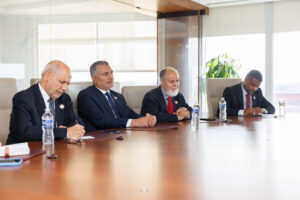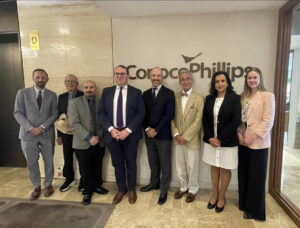On December 12, the US-Libya Business Association (USLBA) held its much-anticipated annual Holiday Reception at the Army Navy Club in Washington, DC. This year’s event was marked by illuminating keynote addresses from Jeff Hulse, the State Department’s Deputy Director of the Office of North African Affairs, and Libya’s Chargé d’affaires, Fadil Sanusi Omar. Their speeches, rich in insights, significantly deepened our understanding of the evolving US-Libya relationship, highlighting both challenges and opportunities.
We were honored to host an array of distinguished guests, including experts from academia, the US government, and leading figures from the private sector. Their diverse perspectives and discussions contributed immensely to the evening’s success, fostering an environment of thoughtful dialogue and mutual learning.
 Their steadfast support, extending beyond financial contributions, reflects a profound commitment to the ideals of collaboration and mutual growth. Their engagement was instrumental in bringing our vision for this event to life.
Their steadfast support, extending beyond financial contributions, reflects a profound commitment to the ideals of collaboration and mutual growth. Their engagement was instrumental in bringing our vision for this event to life.
We extend our heartfelt thanks to everyone who participated, making this event not just a gathering, but a celebration of shared goals and aspirations. As we look forward to 2024, we are more committed than ever to strengthening and advancing the US-Libya economic cooperation, building on the foundations laid by our partners and supporters at this memorable event.



 24, Energy Capital & Power (ECP) will host the Libya Energy & Economic Summit in Tripoli, Libya at the Rixos Convention Centre. USLBA is pleased to announce that our organization will join as a partner for this event.
24, Energy Capital & Power (ECP) will host the Libya Energy & Economic Summit in Tripoli, Libya at the Rixos Convention Centre. USLBA is pleased to announce that our organization will join as a partner for this event.